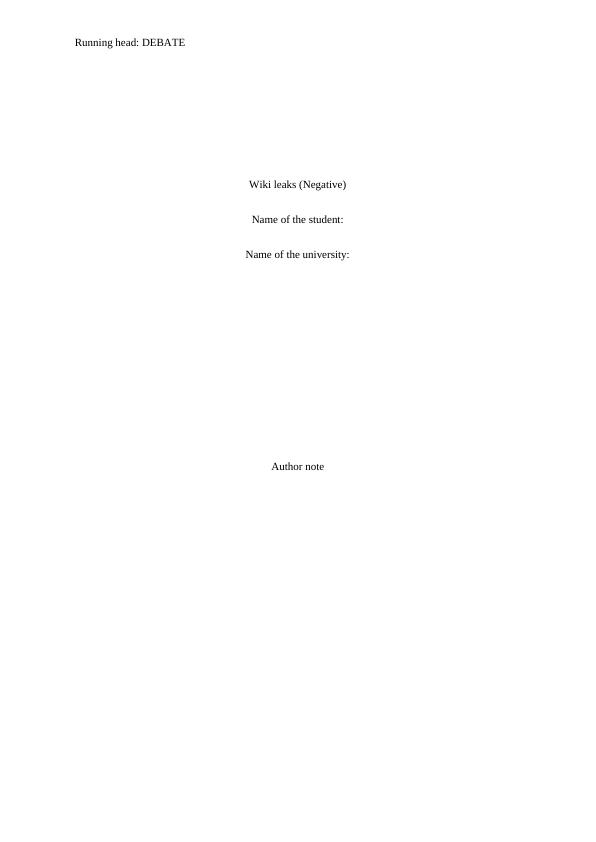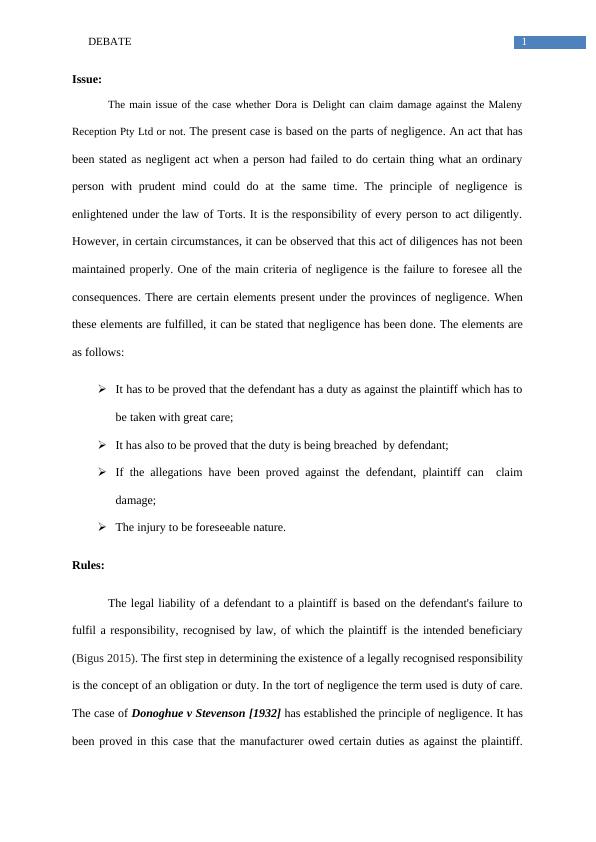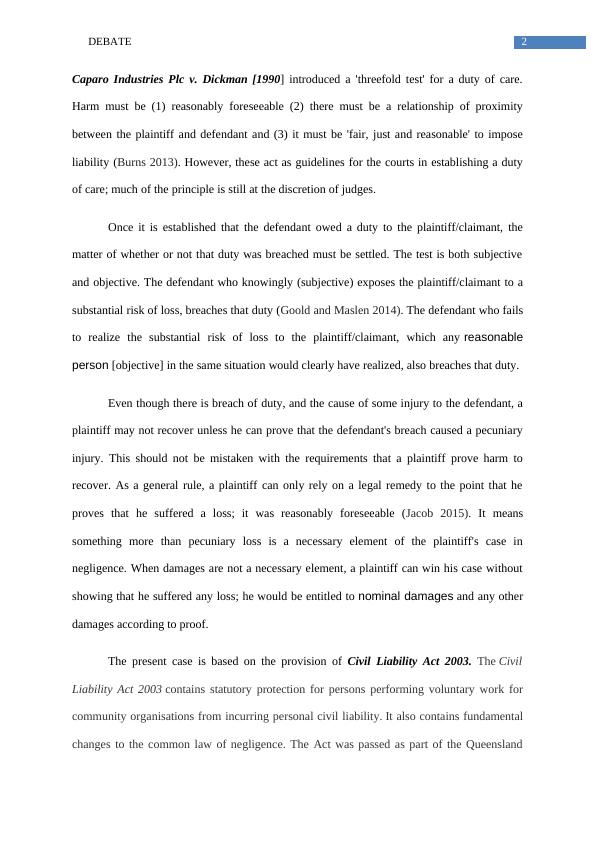Principle of Negligence | Tort Law Assignment
8 Pages1998 Words311 Views
Added on 2020-03-16
Principle of Negligence | Tort Law Assignment
Added on 2020-03-16
ShareRelated Documents
Running head: DEBATEWiki leaks (Negative)Name of the student:Name of the university:Author note

1DEBATEIssue:The main issue of the case whether Dora is Delight can claim damage against the MalenyReception Pty Ltd or not. The present case is based on the parts of negligence. An act that hasbeen stated as negligent act when a person had failed to do certain thing what an ordinaryperson with prudent mind could do at the same time. The principle of negligence isenlightened under the law of Torts. It is the responsibility of every person to act diligently.However, in certain circumstances, it can be observed that this act of diligences has not beenmaintained properly. One of the main criteria of negligence is the failure to foresee all theconsequences. There are certain elements present under the provinces of negligence. Whenthese elements are fulfilled, it can be stated that negligence has been done. The elements areas follows:It has to be proved that the defendant has a duty as against the plaintiff which has tobe taken with great care;It has also to be proved that the duty is being breached by defendant;If the allegations have been proved against the defendant, plaintiff can claimdamage; The injury to be foreseeable nature.Rules:The legal liability of a defendant to a plaintiff is based on the defendant's failure tofulfil a responsibility, recognised by law, of which the plaintiff is the intended beneficiary(Bigus 2015). The first step in determining the existence of a legally recognised responsibilityis the concept of an obligation or duty. In the tort of negligence the term used is duty of care.The case of Donoghue v Stevenson [1932] has established the principle of negligence. It hasbeen proved in this case that the manufacturer owed certain duties as against the plaintiff.

2DEBATECaparo Industries Plc v. Dickman[1990] introduced a 'threefold test' for a duty of care.Harm must be (1) reasonably foreseeable (2) there must be a relationship of proximitybetween the plaintiff and defendant and (3) it must be 'fair, just and reasonable' to imposeliability (Burns 2013). However, these act as guidelines for the courts in establishing a dutyof care; much of the principle is still at the discretion of judges. Once it is established that the defendant owed a duty to the plaintiff/claimant, thematter of whether or not that duty was breached must be settled. The test is both subjectiveand objective. The defendant who knowingly (subjective) exposes the plaintiff/claimant to asubstantial risk of loss, breaches that duty (Goold and Maslen 2014). The defendant who failsto realize the substantial risk of loss to the plaintiff/claimant, which anyreasonableperson[objective] in the same situation would clearly have realized, also breaches that duty.Even though there is breach of duty, and the cause of some injury to the defendant, aplaintiff may not recover unless he can prove that the defendant's breach caused a pecuniaryinjury. This should not be mistaken with the requirements that a plaintiff prove harm torecover. As a general rule, a plaintiff can only rely on a legal remedy to the point that heproves that he suffered a loss; it was reasonably foreseeable (Jacob 2015). It meanssomething more than pecuniary loss is a necessary element of the plaintiff's case innegligence. When damages are not a necessary element, a plaintiff can win his case withoutshowing that he suffered any loss; he would be entitled tonominal damagesand any otherdamages according to proof.The present case is based on the provision of Civil Liability Act 2003.TheCivilLiability Act 2003contains statutory protection for persons performing voluntary work forcommunity organisations from incurring personal civil liability.It also contains fundamentalchanges to the common law of negligence. The Act was passed as part of the Queensland

End of preview
Want to access all the pages? Upload your documents or become a member.
Related Documents
Tort of Negligence in Police Force: Case Study of Sergeant McDonaldlg...
|4
|1322
|82
Tort Law: Negligence and Liabilitylg...
|8
|1794
|32
Tort Law: Duty of Care and Negligencelg...
|9
|1989
|98
Business Lawlg...
|11
|2527
|238
Negligence Claim against Aldi Supermarket: Elements and Defenseslg...
|6
|1446
|283
Tort of Negligence: Liability of Australian Post Employees and Financial Adviserlg...
|9
|2002
|417
